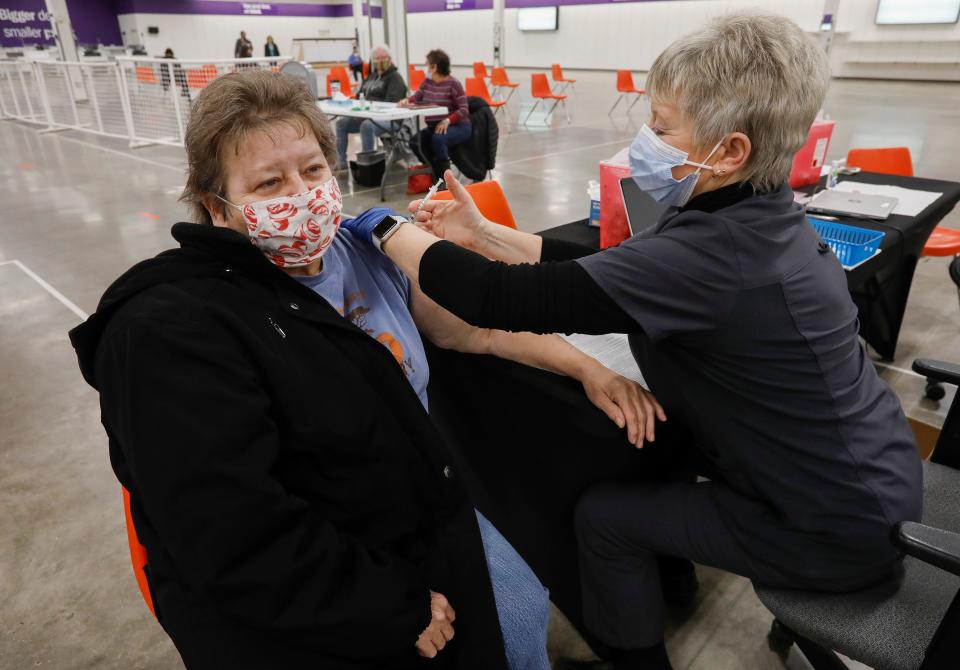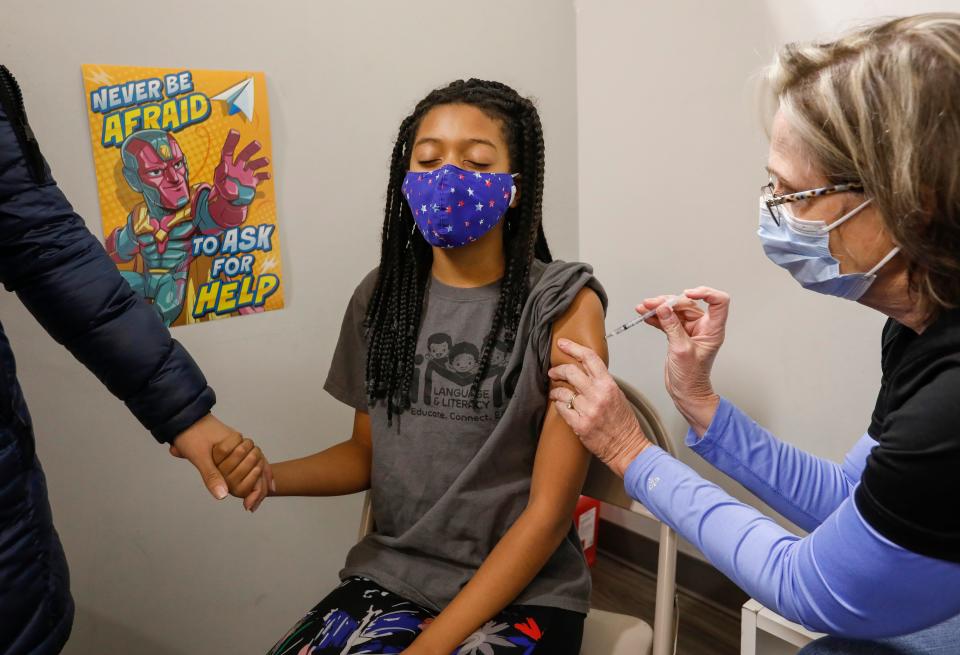Springfield-Greene County Health Department, fighting omicron surge, enters 2022 with 70% vaccinated goal
- Oops!Something went wrong.Please try again later.
This past week, Springfield-Greene County Health Director Katie Towns said southwest Missouri is in for the "worst surge yet" from the omicron variant. She hopes to use what the Springfield learned during the delta surge over the summer to combat this latest outbreak.
For several months over the summer, southwest Missouri was the epicenter of the coronavirus for all of the United States. The delta variant nearly brought Springfield's hospital systems to their breaking point. But Towns told the News-Leader that experience will be vital to surviving the omicron variant.
"We're using that experience to prepare us for the next wave of disease. We're doing some different things to make sure that we're better prepared and more on top of the information that we could have in order to best react. The hardship that we endured, and having that surge and being the epicenter of that activity, has taught us many things that will prepare us for the future," Towns said.

One of those lessons learned is "better monitoring" and the importance of genomic testing. Because Greene County was one of the first places the delta variant hit in the United States, the health department invested in genomic sequencing showing "how the variant is acting in the community."
Once an individual in Greene County tests positive for COVID-19, their test is anonymously sent to a lab that can determine which variant of the virus it contains. That information is then given in aggregate to the health department, although it will not be tied to specific patients. But that does not mean such information cannot inform how Greene County tackles the next surge.
"Over the summer, we started sending samples for sequencing in June and we got it back in July and knew we had delta in our community," Towns said. "Once we confirmed that the characteristics of the virus were very similar in nature, and when we would start to see cases and investigate how the variant is progressing in terms of infecting folks. What we do is we're able to sort of look at that progression of that variant in our community and associated it with those different characteristics. It's not a perfect science but we do associate the differences with the increase in the variant being present in our community."
More: As omicron cases surge, here's where you can get tested for COVID-19 in Springfield
For example, one of the biggest differences with the delta variant was the high susceptibility of children to be infected compared to the original strain. That knowledge of the variant helps coordinate services throughout the community.
In the case of omicron, Towns reiterated the variants is somewhat less severe but much more transmissible. But those characteristics are related — the more people surviving the illness gives the virus more time to infect others.
"If a virus were to kill all its hosts, then it would go away. And so this is the natural progression of viruses over time is that they weaken but then they continue to figure out ways to better spread. If you look at the the future of SARSCOV2, it will become endemic. People will be exposed and it's likely that most of us will contract it at some point. But the goal of vaccination is you have built a level of immunity within your body to help prevent that severe disease from occurring."
Omicron hits a not-so-sweet spot on that curve where the disease creates enough severe infection that many still need hospitalization but also allows for many more to be infected overall.
So far, genomic sequencing has only identified two Greene County residents with the Omicron variant, but that metric is a lagging indicator and is expected to sharply rise in the coming weeks.
Heath department: With omicron variant, ‘worst surge yet’ of pandemic likely on its way to Springfield
Recent projections from the National Institutes of Health show COVID-19 infections in Springfield rising to more than a thousand cases a day very shortly. Some projections show more than ten million new COVID infections nationwide by the end of January — a number that could over-capacitate many hospitals across the country.
According to the New York Times, Cox's and Mercy's ICU capacities are already at 95% and 90%, respectively.
Towns said omicron seemed to be "perfectly designed" to overwhelm hospital systems.
Over the summer crisis, Springfield's hospitals only just escaped the point of turning people away.
"Our hospitals were over capacity in terms of the levels of patients they were seeing. They had never seen that many people with COVID they needed to take care of," Towns said. "But there was never a time where our hospitals actually had to turn away patients."

But Springfield's health leaders were certainly concerned of that possibility at the time — asking the State Emergency Management Agency and the Missouri Department of Health and Senior Services for assistance to set up an "alternate care site" in the county to relieve strain on Cox and Mercy.
That alternate care site never materialized from the state. In hindsight, Towns said she now knows "the type of timeframe the state needs" for setting up an alternate care site.
"We saw that surge so quickly materialize. We in our local area did not have the luxury of giving the advance notice necessary to really trigger the things that needed to take place. I think the state did what they could with the timeframe that we alerted them."
But that new understanding will help the city better navigate state bureaucracy in this latest crisis, she added.
70% vaccination rate still the goal
The biggest priority for the health department in 2022 is still the same as it was last year — to get as many people as possible boosted and vaccinated.
Coming into the new year, 53.7% of Greene County have had one dose of vaccine and 48.9 have had the second. That lags behind both statewide and nationwide figures and is far from the 70% goal the Springfield-Greene County Health Department set out to reach.
"When we set out initially with our vaccine campaign, we aimed at a goal of 70% and that is still something our department holds that we need to achieve," Towns said.
"I really hope by the end of next year, that we have achieved our 70% goal," she added. "Because that's not just some number we picked out, it would mean that we have overcome some of the barriers that still exist. It would mean that we would have figured out ways to create trust and to get people as protected as we can from the virus. It would also mean that we as a community get to move into this next phase overcoming polarization and differences and focus on what is exciting for our community."

Towns pointed to misinformation as "one of the biggest threats to our public health" — saying the politicization of vaccines and the pandemic has bled into other routine vaccinations and medicine generally.
"We sometimes hit sort of a wall of trust and credibility. And I'm not sure how we overcome that completely. It doesn't make us stop trying."
She said the health department will continue reaching out to the community until they reach that 70% threshold.
But what worried Towns even more is how misinformation has seeped into other aspects of the medical field.
"As vaccination itself became politicized, we're going to see a lag on children's vaccinations being up to the same level as before the pandemic. We're going to see a lag on many things that we might have taken for granted years before."
Towns hopes that concern "does not materialize legislatively" — being wary of how the public officials could disincentivize vaccinations more broadly.
"I haven't seen anything along those lines yet, but I know how vaccines have been politicized. And I hope public officials know how much vaccines have done — not just the COVID vaccine — to protect our community. You know, measles is not something that we want to have a resurgence as we continue to battle COVID."
Asked about Attorney General Eric Schmitt's recent letter to school districts and health departments across the state, Towns said the Springfield-Greene County Health Department is "not in any way in violation" of the law and did not change their practices because of the letter.
That letter threatened legal action against local public health agencies and school districts imposing COVID mitigations. It also ordered them to "stop enforcing any mask mandates, quarantine orders, or any other public health orders that are null and void" under Schmitt's interpretation of a recent state court ruling.
Towns maintains the health department is in compliance with the letter because they are not involved with enforcing any COVID mitigations. But that letter prompted several health departments across the state to drop their COVID-related services altogether and Towns sees that as a problem.
"When you're fighting things like viruses, you can't see them and so they spread beyond borders without being told what to do or not to do. So, when health departments have... either been forced to or had to make the hard choice to move away from mitigation techniques, the reality is that the disease is going to spread. And it's not going to be limited to one county jurisdiction."
Springfield Public Schools recently ended several mitigation efforts, like masking and quarantine orders. Towns said the health department is "watching that situation closely" and hoping the number of vaccines given to younger children will curb the most severe omicron cases in Springfield's youth.
Towns' year 'trial by fire'
The past year also marked Towns' first as director of the Health Department — a "trial by fire" she called it.
"Leading the health department has come with challenges. We were exhausted, all of us were exhausted and then this huge surge came out of nowhere over the summer. It was very hard," Towns said. "And I want everyone to know that it's OK to need help. I see a counselor regularly and that is tremendously helpful to me in terms of being able to help me refocus. And there should not be a stigma with that."
Towns is particularly concerned mental health issues have fallen by the wayside as the health department has spent the vast majority of their focus on the pandemic.
"That is the stuff keeping me up tonight right now. Before the pandemic, we had a pretty large-scale mental health and substance abuse crisis in our community. We had identified some priority areas and then suggested some strategies on how we could assure those different gaps in our community. But during the pandemic and these surges, we can only do so much."
Towns hopes as more become vaccinated, the Health Department can again focus on these issues.
While not going into many details, Towns said the toll on her mental state came from criticisms of her leadership that sometimes metastasized into threats. In part, that criticism is why Towns shared her survival of breast cancer during the summer surge.
"I told that story because it was an opportunity to sort of reestablish what I know to be true about myself and my department and the team members here. Why we get up and do our jobs every day — it's not to seek to control or to have power. In fact, I think that is the exact opposite of what the folks here in this department are seeking to do."
For Towns, sharing her history of cancer was a way to show her critics "we are human too."
Despite the dire projections of the omicron variant, Towns is hopeful for herself and the community she serves. In large part, that's because both of her kids are now fully vaccinated and the community's children have that opportunity too.
"That means so much to me, my family. It feels so good because we get to celebrate Christmas with my family this year, which we haven't done in two years. And I have a niece who is a toddler and a grandfather who's almost 94. Both of them are highly at risk, so we are thrilled because we all are fully vaccinated and are able to be together. I hope more families get that in 2022."
This article originally appeared on Springfield News-Leader: How Health department is battling COVID surge in southwest Missouri

